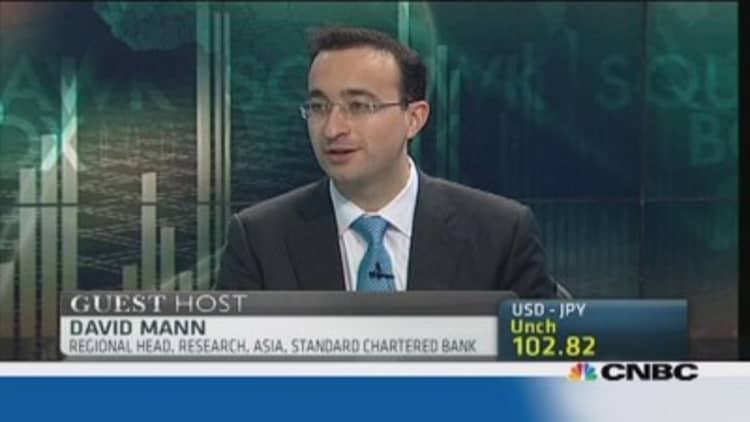Asian equity markets declined on Wednesday following a weak handover from Wall Street and as investors showed little reaction to news of a U.S. budget deal.
Earlier in the session, Senate Democrats and Republicans reached a deal to reduce automatic spending cuts and provide $23 billion in deficit reduction spread over two years. That saw modest gains in U.S. stock futures during Asian trade while yields on the 10-year note were little changed around 2.8 percent.
"As a result [of the deal], U.S. fiscal issues are likely to be less of an issue for investors next year. The short term fiscal easing next year will also further boost US. economic growth. It adds confidence to our view that the U.S. will grow 3 percent next year," said Shane Oliver, head of investment strategy and chief economist at AMP Capital.
(Read more: What the US budget deal means for equity markets)
Europe deal watched

Meanwhile, the euro moved off its six-week peak against the dollar following news that European finance ministers failed to agree on how to wind down ailing banks. They are due to meet again in Brussels next week to try and reach an accord.
Shanghai falls 1.5%
The benchmark Shanghai Composite closed at its lowest level in two weeks as nervous investors awaited updates from the government's annual Central Economic Work Conference (CEWC), which began on Tuesday.
Coal producers dragged after the country's top economic planner said coal's use will be curbed to combat pollution. China Shenua, Yanzhou Coal and Datong Coal lost 2 percent each.
Automakers tumbled despite vehicle sales rising 14.1 percent in November from a year earlier, according to the China Association of Automobile Manufacturers (CAAM). Jiangling Motors skidded 4 percent while SAIC Motor lost 2.6 percent.
In Hong Kong, HSBC fell 1 percent after Spanish lender Santander bought its 8 percent stake in Bank of Shanghai for 470 million euros.
Nikkei 0.6% lower
Japan's benchmark pared losses after hitting a one-week low earlier in the session as a stronger currency weighed on sentiment and offset optimism over upbeat economic data. The yen rose to 102.54 per dollar as fears of a looming reduction in U.S. stimulus led investors to safe-haven assets.
Core machinery orders rose 0.6 percent in October, rebounding from a decline in September, in a sign that companies are finally increasing capital expenditure. Despite that, industrial manufacturers like Nintendo, Nissan Motor and Komatsu over 1 percent each.

Internet gaming site Gree closed 2 percent higher following an earlier 20 percent rally as investors continued to cut their bearish bets on the stock.
(Read more: Household help plan shows Japan's immigration dilemma)
Sydney eases 0.7%
Australia's ended at its lowest level since August 29 following two consecutive sessions of three-month closing lows.
The nation's third-biggest copper producer, Oz Minerals closed down 14 percent following a 30 percent plunge earlier in the session after saying that gold and copper resources at one of its South Australian mines have not increased despite intensive drilling efforts, which could mean the firm may have to acquire new mines.
Retailers lost ground after a private survey showed consumer sentiment falling in December. Myer led losses by over 4 percent while Woolworths eased 1 percent.
Kospi slips 0.8%
South Korean shares fell to a one-month low as caution set in ahead of Thursday's Bank of Korea (BOK) policy decision. The BOK is widely expected to hold its policy rate steady at 2.5 percent for a seventh straight month.
Index heavyweights Samsung Electronics and Posco fell over 1 percent each.
India down 0.6%
Indian shares extended losses for a second day after data showed November exports rose an annual 5.86 percent from a year earlier.
— By CNBC.com's Nyshka Chandran. Follow her on Twitter @NyshkaCNBC

